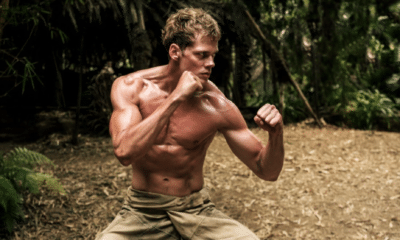Noriyuki ‘Pat’ Morita will always be remembered for his Oscar-nominated portrayal of Mr. Miyagi in John G. Avildsen’s enduring 80’s classic The Karate Kid. It is the kind of defining role that both cements an actor’s legacy and also, in the case of Morita, further pigeonholed the Japanese-American actor in the eyes of Hollywood. It is this aspect of the role, and Morita’s life before, during and after the success of The Karate Kid that takes the focus of this new documentary that seeks to reveal more about the man, his struggles and the impact his career has had concerning on screen representation as a whole.

Director Kevin Derek, who was also behind the documentary The Real Miyagi which focused on Morita’s stunt double for The Karate Kid films, karate master Fumio Demura, crafts quite an intimate portrait of the late Morita (who passed away in 2005). It is a portrait made up of talking head collaborations with many of his colleagues from his Happy Days tenure to The Karate Kid franchise, but is largely driven by Evelyn Guerrero, Morita’s widow, who promised to deliver his life story truthfully and in a very candid manner. It is this candid approach that makes More Than Miyagi a truly enlightening film, one that crafts a picture of a charismatic and well loved man, but a very troubled one at that.
Through talking head interviews, archive footage of Morita himself, as well as new talking heads with the likes of Henry Winkler, Ralph Macchio and Martin Kove, most of the significant cast members who shared the screen with Morita are present and correct. They clearly all relish talking about their late colleague, with many of them quick to enthuse about his spirited personality. The role of Mr. Miyagi does indeed still take up a great deal of this narrative, but there are also some fun dives into his rise as a stand up comedian, a move he decided to make when he hit the age of 30 and decided if he was ever to get into show business, it was now or never.
That rise to fame is very interesting to see recalled by both Morita and those who were around him at the time. Fans get a strong sense and experience of the kind of self-effacing humour that he made his trademark, often calling out audience expectations of how he should act and sound as a Japanese American comedian. It is also very interesting to see just how significant a comedy actor he was before Miyagi as well, with a strong volume of work as a proficient sitcom guest star on the likes of MASH and Sanford and Son, before getting a recurring role as Arnold in the Happy Days cast come its third season.
Seeing the broad strokes of his career recalled will certainly be of interest to fans of both The Karate Kid films and Morita as a performer, but the documentary is always more engaging when it begins to reveal more about the man himself, as it soon becomes clear that he was a very troubled man with a lot of sadness running deep under the surface. From hearing of his childhood that was spent predominately in hospital undergoing treatments for spinal TB, before his family then being placed in an internment camp in Arizona during the Second World War, there’s a lot of tragedy in the man that clearly helped contribute to his talents as a dramatic actor.
From a very young age, it is revealed, Morita struggled with alcoholism, a battle that continued far into his life, with himself often stating that he would often be drunk most of the days of the week, but no one would particularly notice. It is a battle that ultimately contributed to his career downturn later in life, but the doc never puts blame on Morita and treats alcoholism as it is: a disease. The film shows an actor often struggling with his identity as a Japanese-American man, something fuelled by the racist environment post-War America became towards the Japanese, leading to many families pretending they were Chinese in order to avoid aggression from their white American neighbours.
The film, particularly in its final third where it is at is most poignant, also speaks to Morita’s unease with the kinds of roles he was often asked to play, and how he fits into the larger narrative of Hollywood’s history of systematic racism in regards to roles for Asian actors, with the role of Miyagi itself still standing as a case of pigeon-holing to a specific on screen stereotype. The film has a very frank discussion about both Morita’s struggles with his identity as an Japaense-American, and to Hollywood’s relationship with on screen representation, making it more than just a piece of fan adoration. It is a film that both shows a lot of love for a beloved and troubled actor, but also one that makes sure to frame his career in the larger context of representation on screen for Asian American characters, and how that fight for more authentic representation against offensive stereotypes is still being fought today.
What one comes away with from More Than Miyagi is indeed a fuller sense of the kind of man Pat Morita was. He was a talented actor, comedian, and seems to have been damn good company. But he was also a man who had his demons, ones that he often didn’t know how to control beyond reaching for a drink. This documentary is clearly put together with compassion and features contributions from individuals who cared for him, giving the sense that this is the kind of candid portrait that he would not have argued with. An often touching and surprising account of the actor behind the iconic figure of Miyagi.
More Than Miyagi is available on demand now In the UK from Amazon, Google Play, YouTube, and Vimeo.
More Than Miyagi
Andrew Gaudion
Summary
A film offering a fuller sense of the kind of man Pat Morita was. Put together with compassion; a film which is often touching and surprising.

Latest Posts
-


Interviews
/ 12 mins agoInterview: Director Moritz Mohr on the creation of ‘Boy Kills World’
Boy Kills World will arrive into UK and Ireland cinemas from Friday 26th April...
By Kat Hughes -


Film Trailers
/ 21 mins agoTrailer for new horror-thriller ‘New Life’ as UK release is set
Check out this very first trailer for the upcoming horror-thriller New Life which is...
By Paul Heath -


Features
/ 28 mins agoInside the Mind of Mike Fleiss — Vision, Ambition, and the Drive for Innovation
With an IMDb page packed with a host of TV and film accomplishments, Mike...
By Paul Heath -


Film Reviews
/ 34 mins ago‘Humane’ review: Dir. Caitlyn Cronenberg (2024)
The Cronenberg name is synonymous with strange movies. It began with David Cronenberg, and...
By Kat Hughes













